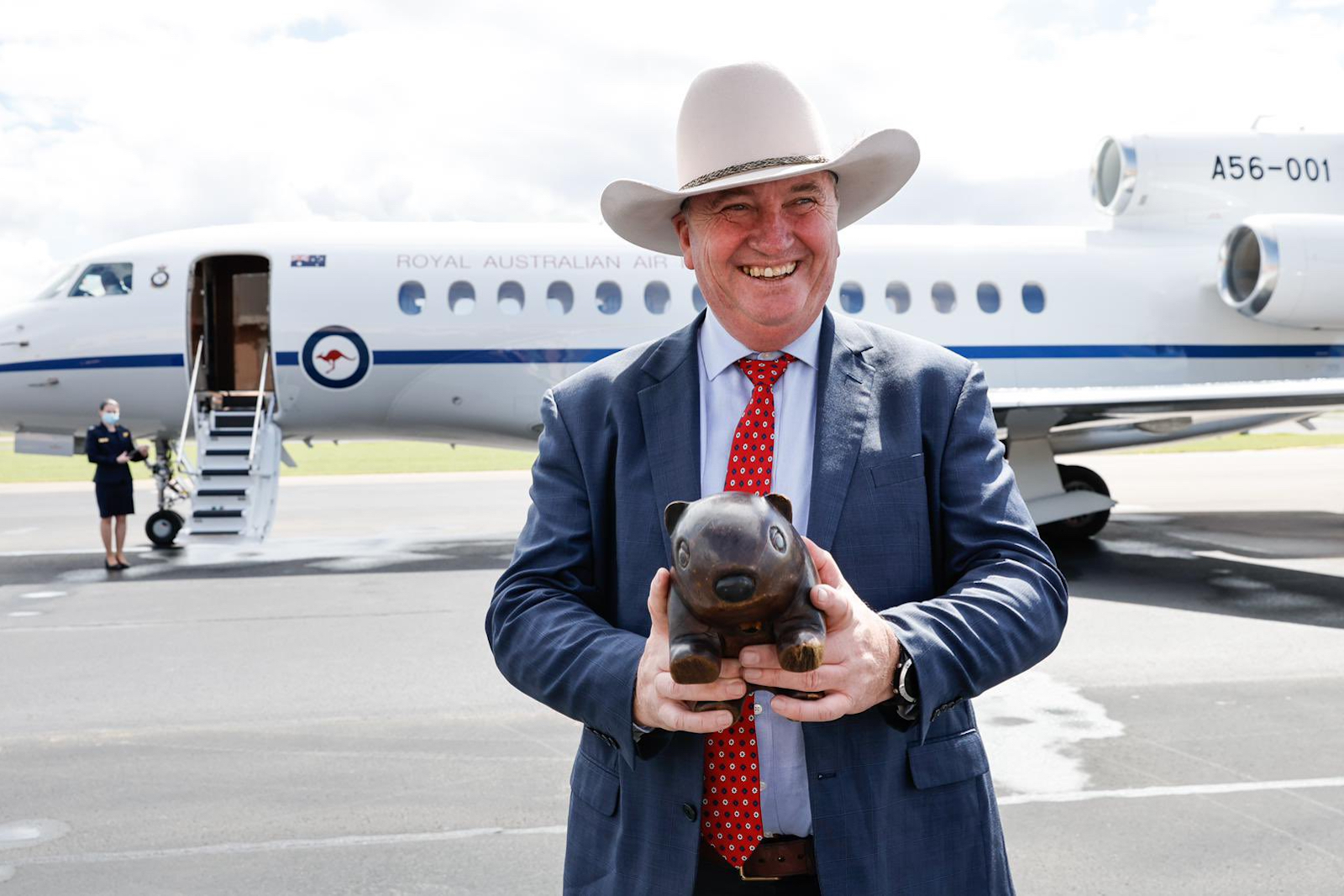
Barnaby Joyce: Election Gonzo and China Fears
Always looking, and sounding, a touch unhinged, the beetroot-coloured Barnaby Joyce, leader of the Australian Nationals and, for a time now, deputy prime minister, has made a splash. With the federal elections being held on May 18, he does not have much time to commit mischief and befuddle the political vultures. But the National Press Club gave him a chance to make some trouble, a task accomplished with some success.
At stages during his address, it seemed that trouble had followed Joyce. There was sniffing and sniffling. Then a nosebleed, brief intermission, and tissues. The Twitterati thought this ominous; political commentators searched for omens about previous pre-election mishaps. “I know you are going to get 1001 photos of me with a Kleenex up my nose, congratulations,” he chirped, on being handed a fresh tissue.
Of more interest, and some bafflement, was the speech itself, a filling of meaty prejudices and concerns about China, a fairly dismissive take on climate change, and a warning about the threat posed by a number of independent candidates that are knocking at the door of traditional conservative seats.
As far as Beijing is concerned, Joyce presents the classic Australian paradox: a pathological suspicion of the Yellow Horde and its strategic interests, but a delight at the voracious appetite they show for Australian commodities. In recent years, Australia’s skewed and distorted pattern of wealth has developed on the back of that particular interest. The same can also be said about the China student market and witless Australian universities lazily disposed to easy cash.
Missed the Deputy Prime Minister, @Barnaby_Joyce, address the National Press Club yesterday? Watch it now on the NPC YouTube Channel: https://t.co/Wnh5fLA0Vh
— National Press Club (@PressClubAust) May 12, 2022
The role played by China in aiding Australian wealth did feature, if only to enable Joyce to speculate wildly as to who would replace it as top customer in the importing of iron ore exports. This proved particularly pertinent on the issue of how Australian commodities were essentially going into Chinese war-making capabilities.
In his answer, Joyce recalled “talking to one of the large miners” and saying that “we have a big new customer.” That customer: Germany. “Germany is a big new customer. And I imagine Germany is using the iron ore for a whole range of things and of course, one the other Germany is redoing, rearming.” When “rearming” and “Germany” are used, however disjointedly, in a sentence, ghosts of wars past stir nervously.
Not, it would seem, now. A Teutonic replacement would be welcome in the face of Beijing’s regional ambitions. Chinese military expansion, Joyce stated unequivocally, was “without a shadow of a doubt” the most important issue facing Australians.
Inventively, and with a flourish, he took the view that China’s conduct in seeking security ties with countries such as the Solomon Islands was simple: the encirclement of Australia. “It is quite obvious through their desire to have military bases that they are starting a process of encircling Australia and that there is a wish, at the very least, to intimidate, or worse, to supplicate Australia.”
Joyce has never quite had the mind or sense to understand the historical basis of China’s own concern of encirclement, a psychic disturbance very much aided by the United States and the recent AUKUS security pact. The same can be said about his understanding of independent candidates, whom he rubbishes as being incapable of understanding national security.
Such novel, absurd and dangerous interpretations on the wishes of a power can become, at a moment’s notice, the bricks and mortar for conflict. “The thing that China will respect is strength. That’s why I say we have to become as strong as possible as quickly as possible. And respecting strength means you have to be strong across all facets of what you do.”
Giving the impression of being far-eyed and sagacious, Barnaby spoke of his role in preventing previous efforts by Chinese entities to acquire Australian assets and muscle in on domestic matters. “I refer to my successful endeavours to stop a Chinese state-owned enterprise takeover of Rio Tinto, our largest iron ore exporter, back as far as 2009.” He then boasted of his support for “changes in foreign investment laws which the Labor Party opposed.”
When asked about the touchy issue of climate change and disagreement within his own party and his Liberal coalition partners, he was unperturbed. Metropolitan, ecology-minded types, despite being threatened by the so-called “teal independents,” would not have their way on the issue of preventing coal projects. “Because what we are doing is…we have got to make sure our nation earns as much money as possible. We can’t do that if we shut down coal exports.” What vision, what clarity.
What about the issue of the Coalition’s “safeguard mechanism” in responding to climate change? In a sense, this looks suspiciously like a version of the demonised carbon tax, an idea considered pestilential in pro-fossil fuel circles. The mechanism requires polluting companies to purchase carbon credits or, in lieu of that, reduce emissions. “It’s like the ceiling on this,” the cryptic Barnaby intoned. “It’s out of the way but it stops you [from] going through the roof. They [Labor] are going to bring the ceiling down to about head level for tall people. And about 215 [companies] are going to start belting their heads on the fans and the lights and being fatally attacked based on that.”
In all the hyperbolic, and at points inscrutable venting, Joyce struggled with the correct pronunciation of Labor opposition leader Anthony Albanese, the man vying to be the next prime minister. Several attempts were made, none quite hitting the mark. Labor will be hoping that such misfiring will translate into electoral returns. Given Joyce’s previous successes, this will prove a tall order, notably in regional Australia.

